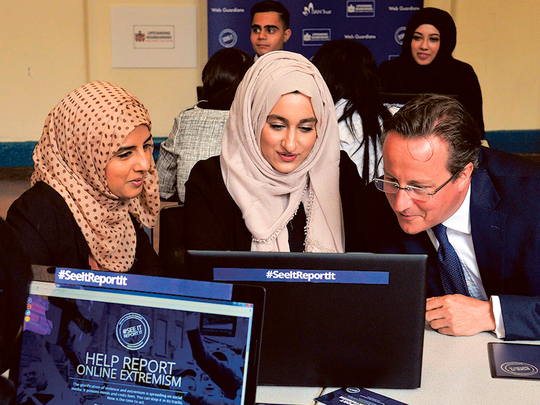
London: British Prime Minister David Cameron set out a five-year strategy to tackle extremism in Britain on Monday, vowing to take on those responsible for radicalising young British Muslims and demanding that internet companies do more to help.
Cameron outlined a counter-extremism strategy designed to halt the spread in Britain of the radical ideology promoted by Daesh.
He singled out internet companies as needing to do more to help the fight against extremism, especially among young people.
“When it comes to doing what’s right for their businesses they’re happy to engineer technologies that track our likes and our dislikes,” he said, without naming specific firms.
“But when it comes to doing what’s right in the fight against terrorism we too often hear that it’s all too difficult — I’m sorry I just don’t buy that.”
The prime minister made a keynote speech on extremism in Birmingham, England’s second city, which has a large Muslim population.
He pledged to tackle what he called “the failures of integration” which have seen hundreds of UK citizens joining Daesh militants.
Cameron described the battle with extremism as “the struggle of our generation”.
He added that the “subversive” and “exciting” ideology is drawing in young people, just as fascism and communism did in the past.
It is “drowning out” strong, positive moderate Muslim voices, he warned. “The adherents of this ideology are overpowering other voices within Muslim debate, especially those trying to challenge it.”
Cameron set out four major issues which needed to be addressed — countering the “warped” extremist ideology, the process of radicalisation, the “drowning out” of moderate Muslim voices and the “identity crisis” among some British-born Muslims.
He talked about Britain as a “multi-racial, multi-faith democracy” and as a “beacon to the world”. He said no one should be demonised and moderate Muslims also hated the “sick world view” of extremists.
“I want to work with you to defeat this poison,” he said.
Shared values
Cameron said: “This is how I believe we can win the struggle of our generation. Countering the extremist ideology; standing up and promoting our shared British values; taking on extremism in all its forms, both violent and non-violent; empowering those moderate and reforming voices who speak for the vast majority of Muslims that want to reclaim their religion; and addressing the identity crisis that some young people feel by bringing our communities together and extending opportunity for all.”
He revealed that he has hired Louise Casey, the government’s “troubled-families tsar”, to begin the new study.
At least 700 British citizens are thought to have gone to fight with Daesh in the Middle East, of whom at least 60 are understood to have died. A large proportion have returned to the UK, where they are considered a threat by the security forces.
Cameron said the UK should “do more” than just provide logistical backup for US attacks, telling NBC journalists: “We have to destroy this caliphate, whether it is in Iraq or in Syria.”
It emerged last week that some British pilots had already been involved in strikes over Syria because they were embedded with US and Canadian forces.
Lord Richards, former chief of the defence staff, told the BBC Andrew Marr Show that politicians had not yet woken up to the sheer scale of the military effort required.
New war
He said there needed to be a “massive” international operation, with a proper command-and-control centre, citing the example of the Second World War.
For now, the western powers were merely “dribbling instead of clouting”, he said, adding: “I agree utterly with the prime minister that we need to remove the caliphate.”
Tim Farron, the new leader of the Liberal Democrats, said on Sunday that Britain should tread carefully before being sucked further into a new war in the Middle East. There was a danger that Cameron and President Barack Obama were being dragged into the same mistakes as Tony Blair and George W Bush more than a decade ago, he said.
Casey’s remit is to look at how the government can lift the horizons of isolated and deprived communities and increase opportunities for young people from ethnic minorities.
She will examine getting people to learn more English, improving job opportunities and promoting greater integration.
But Cameron will criticise those who suggest that terrorists are driven to their actions by poverty. “Many of them have had the full advantage of prosperous families and a western university education,” he will say.












